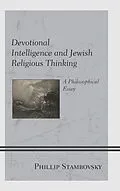This groundbreaking neo-Maimonidean work establishes, on independently philosophical grounds, the intellectual warrant of Jewish religious thinking as "devotional intelligence." It demonstrates the purchase and intellectual authority of such thinking by appeal to two dialectically interrelated principles: on the one hand, the metaphysical principle that knowing is of being; and, on the other, "sacral attunement," a normative principle. Part I distinguishes this study from leading work in contemporary philosophy of Judaism. It introduces the game-changing bid to privilege "intelligence" in the onto-epistemological Aristotelian sense, over epistemologically orchestrated, post-Enlightenment "reason" when it comes to assessing the intellectual soundness of religious thinking. Part II distills contemporary elements of Aristotle's onto-epistemological psychology of intelligence that Maimonides incorporated in his philosophy of Jewish religious thinking. Further, it finds in Hegel a bridge between Maimonides' account of devotional intelligence and a modern Maimonidean "science of knowing" dedicated to religious thinking. Part III turns to "sacral attunement," foregrounding the normative "devotional" aspect of devotional intelligence. It probes the intentionality of both onto-epistemological attunement and the "sacred" relative to "the factor of the transcendent." In the process it identifies and applies elements of an existential phenomenology of "fundamental attunement" that thematize defining realities of the sacral attunement unique to normative Jewish covenantal praxis. A related analysis of "the sacred" in religious thinking follows, which segues to a chapter on the "factor of the transcendent" as a seminal constituent of meaning in both the sciences and religion. Part IV applies and amplifies key findings in light of a signature Jewish devotional theme: the divine names, approached from a signally Maimonidean, apophatic position indexed to the factor of the transcendent as the "unconditioned condition" (Kant) of intelligible meaning as such. Distinguishing what the divine names indicate from what they refer to, the essay concludes by substantiating the intellectual warrant of Jewish religious thinking as a devotional intelligence of the relation-of identity-in-difference-between the attributive names and the Tetragrammaton.
Autorentext
Phillip Stambovsky teaches philosophy at Fairfield University and is author of Inference and the Metaphysic of Reason (2009).
Klappentext
This groundbreaking neo-Maimonidean work establishes, on independently philosophical grounds, the intellectual warrant of Jewish religious thinking as "devotional intelligence." It demonstrates the purchase and intellectual authority of such thinking by appeal to two dialectically interrelated principles: on the one hand, the metaphysical principle that knowing is of being; and, on the other, "sacral attunement," a normative principle. Part I distinguishes this study from leading work in contemporary philosophy of Judaism. It introduces the game-changing bid to privilege "intelligence" in the onto-epistemological Aristotelian sense, over epistemologically orchestrated, post-Enlightenment "reason" when it comes to assessing the intellectual soundness of religious thinking. Part II distills contemporary elements of Aristotle's onto-epistemological psychology of intelligence that Maimonides incorporated in his philosophy of Jewish religious thinking. Further, it finds in Hegel a bridge between Maimonides' account of devotional intelligence and a modern Maimonidean "science of knowing" dedicated to religious thinking. Part III turns to "sacral attunement," foregrounding the normative "devotional" aspect of devotional intelligence. It probes the intentionality of both onto-epistemological attunement and the "sacred" relative to "the factor of the transcendent." In the process it identifies and applies elements of an existential phenomenology of "fundamental attunement" that thematize defining realities of the sacral attunement unique to normative Jewish covenantal praxis. A related analysis of "the sacred" in religious thinking follows, which segues to a chapter on the "factor of the transcendent" as a seminal constituent of meaning in both the sciences and religion. Part IV applies and amplifies key findings in light of a signature Jewish devotional theme: the divine names, approached from a signally Maimonidean, apophatic position indexed to the factor of the transcendent as the "unconditioned condition" (Kant) of intelligible meaning as such. Distinguishing what the divine names indicate from what they refer to, the essay concludes by substantiating the intellectual warrant of Jewish religious thinking as a devotional intelligence of the relation-of identity-in-difference-between the attributive names and the Tetragrammaton.
Inhalt
Preface
Introduction
Part I
Jewish Philosophy and the Idea of a Philosophical Science of Devotional Intelligence
Chapter 1 Philosophy of Judaism and the Idea of a Science of Knowing Dedicated to Jewish
Religious Thinking
Chapter 2 Devotional Intelligence as the Focus of an Essay in the Science of Knowing
Part II
Intelligence and Maimonidean Religious Thinking: That Knowing is of Being
Chapter 3 Maimonides, Intelligence and Judgment in Religious Thinking
Chapter 4 Intelligence in Maimonides' Ontotheology and in Aristotle's De anima: Tracing and
Retrieving the Onto-Epistemological Core of Devotional Intelligence
Chapter 5 G. W. F. Hegel's Psychology of Intelligence as a Resource for a Modern Maimonidean
Appendix I: Hegel's Conception of Intuition and Devotional Judgment
Appendix II: Prophetic Intuition
Part III
Devotion as Sacral Attunement: Meaning and the Factor of the Transcendent
Chapter 6 Fundamental Attunement, the Religious Act, and the Onto-Epistemology of the Sacred
Chapter 7 The Shared Warrant of Sacrally Attuned and Scientific Judgment: Meaning and the Factor
of the Transcendent
Part IV
Application and Amplifications:
The Intellectual Warrant of Religious Thinking of the Divine Names
Chapter 8 Jewish Religious Thinking that Identifies the Attributive Divine Names with the Tetragrammaton
Conclusion
Bibliography
Index
About the Author
